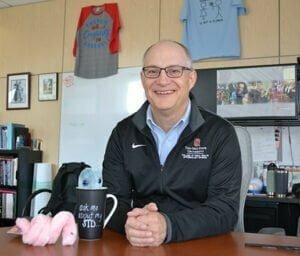SER Presidents Message
 I had planned to use this president’s message to describe strategies for getting the most out of a conference. But then I had an email from Dr. Nedghie Adrien, President of SER’s Student and Postdoc Committee. Her words made me reflect on the pain that violence is causing in so many places worldwide, close to home and far away. Although I don’t study violence prevention, I have been thinking about violence for decades. Recent events have rekindled those thoughts.
I had planned to use this president’s message to describe strategies for getting the most out of a conference. But then I had an email from Dr. Nedghie Adrien, President of SER’s Student and Postdoc Committee. Her words made me reflect on the pain that violence is causing in so many places worldwide, close to home and far away. Although I don’t study violence prevention, I have been thinking about violence for decades. Recent events have rekindled those thoughts.
Personally, I find it challenging to focus when the world is suffering. Just over two months ago, on my very own campus, a faculty member was killed by a graduate student. That senseless killing occurred in my son’s building, where he usually spends his days doing his graduate work in chemistry. Fortunately, for him and our family, that day, he was working from home. Still, I can’t help but think about what comes next—when, where, how. And global conflicts also weigh heavily. According to the Council on Foreign Relations, 27 global conflicts are ongoing. In other words, over 10% of the world’s countries are involved in some form of armed conflict.
For most of the past 20 years, I have worked with colleagues in Russia and Ukraine to study substance use and HIV infection. My colleagues in both countries are all struggling. But even in war, the public health issues that we were addressing don’t disappear because their world is turned upside down. Yet the attention of these public health researchers is diverted. And that means public health suffers, well beyond the direct impact of the war itself.
So, what are we as epidemiologists to do? Do we just put our head down and keep doing our work? Or do we give up our own work to do something that may feel more direct and relevant? I’m reminded of an allegory that I learned in my 20’s that still guides me. A group of friends is hiking together up a very steep mountain. The hike is long, and the summit is nowhere in sight. The friends each have their own gear, but there’s also a communal pack that holds all the materials that the group needs to survive. Someone must carry that pack along with their own. It’s heavy. It’s hard. But in turn, each person takes up the communal pack and goes until they can’t go further. Then, they pass the pack to the next person and fall back in line to recover.
I think that’s where the lesson lies. We all must recover for the community to thrive collectively. So, despite all that is going on around us, our work continues to be important. It continues to make a difference locally and globally. I hope that as epidemiologists, we can continue our research and make a difference. And support each other when it is their time to fall back in line to recover.
Plans are well underway for the mid-year meeting in Toronto in March and the annual meeting in Austin in June. The annual meeting is shaping up beautifully with a mix of methods and substantive work. Several sessions fall within the social epidemiology realm, which I think is particularly fitting at this moment in our disrupted world.
I promise that before the annual meeting, I will devote some of the president’s message to effective conference attendance. But for now, I hope that all of you can find space for peace and recovery. Your work is important. And I hope you are rested and ready when your turn to carry the communal backpack comes.
Bill Miller, SER President
